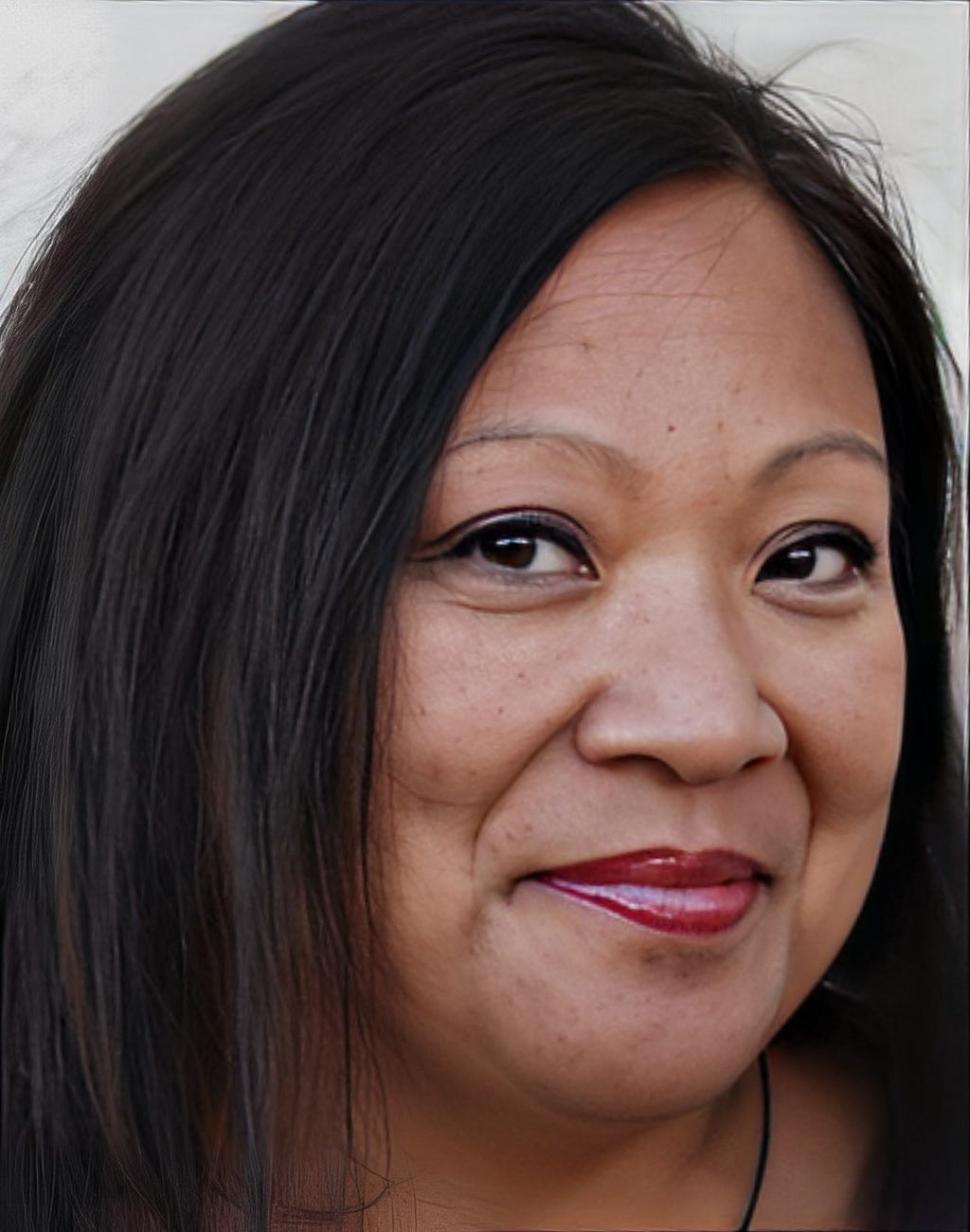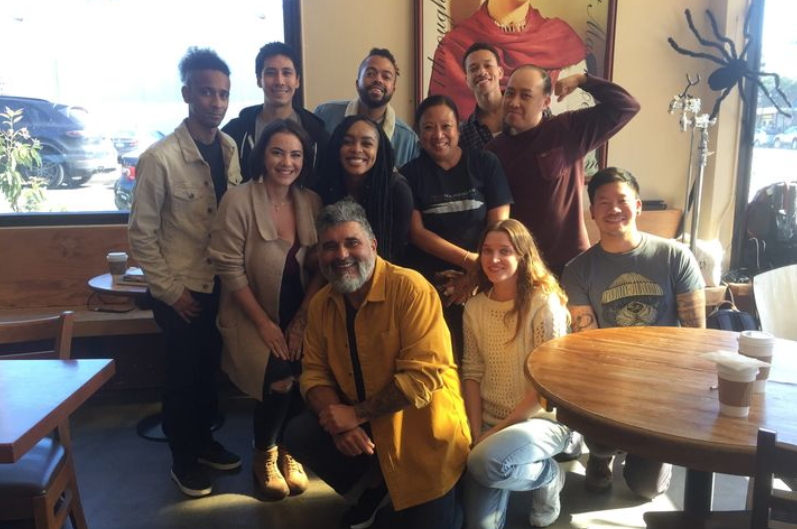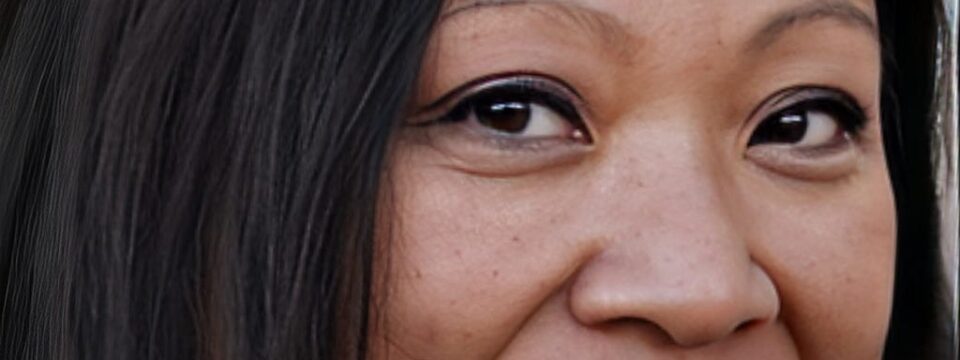Maria Picar of Asian Mainstream Productions: 5 Things I Wish Someone Told Me When I First Became A Filmmaker

Be flexible- everything never really turns out the way you originally visualized it, but maybe having another alternative can work even better. This applies to all aspects of filmmaking in my opinion. Sometimes you just don’t have the budget to do a scene or the actors you want are not available on the day your filming and you have to call someone else. Always have a plan “B”
As a part of our series called “5 Things I Wish Someone Told Me When I First Became A Filmmaker”, I had the distinct pleasure of interviewing Maria Fe Picar.
Maria Fe Picar was born and raised in San Francisco and was originally a professional dancer studying with such Bay Area greats as Alonzo King, Cheryl Chaddick and Blanche Brown. She became interested in acting and film when she took a Voice Over class with Elaine Clark and decided that she wanted to do more Voice Over work. Since then, she started just auditioning for Dramatic and Comedic roles and was cast in numerous productions that included theater and film. She co-founded Asian Mainstream Productions in 2005, a film collaborative that emphasizes Asian talent, but most of all gives beginning through professional filmmakers a chance to connect and work with others in the industry. Today, she has produced and directed over twenty shorts, two feature films and co-produced projects for others in Narrative, Music Video and Documentaries. Her passion for film comes in the form of her desire to help others succeed and her advocacy for community networking and events.
Thank you so much for joining us in this interview series! Our readers would love to get to know you a bit better. Can you tell us a bit of the ‘backstory’ of how you grew up?
I grew up in San Francisco attending Catholic Schools from Kindergarten to high school. My parents were immigrants from the Philippines, my dad serving on ships in World War II and eventually became a doorman at Crest Royal Apartments in Pacific Heights. My mom was a nanny for wealthy families in Santa Barbara and eventually a nurse. I was thrown into piano and dance at an early age because my mom loved the performing arts and my dad was also into music having played the mandolin. They wanted my sister and I to have that “arts” education. I went to local schools and then eventually got a degree from San Francisco State University in Physical Education/Dance. From there I started teaching and performing throughout the Bay Area and eventually started my own Dance Studio/Performing Arts Center- Ingleside Creative Arts. I was then recruited by the San Francisco Foundation to become an “Artist- In — Residence” for one of their grants involving the performing arts in the Ingleside community in which I lived. I started the “Arts Connection” performing arts program for high risk youth that was available at local YMCA Beacon Centers and SF Parks and Recreation Programs. The program included Dance, Music, Drama, and Visual Arts. This was a great program funded by the San Francisco Foundation and then I later became a non-profit under their umbrella with “The OMI Cultural Participation Project”. I was fortunate and grateful to become a community advocate for my neighborhood putting on cultural and performing arts events that were free to the general public and also working with the local Supervisors and eventually even the Mayor. At the time I was also getting into acting and film and found a way to mesh the two together and eventually formed “Asian Mainstream Productions”. Asian Mainstream Productions was a film collaborative where we were able to write our own projects into finished pieces. We had actors, directors, producers, writers, production assistants, assistant directors to name a few work on each others work together and it was really fun and rewarding!
Can you share a story with us about what brought you to this specific career path?
I was brought to this specific career path in film when I found that while being an actress and Voice Over artist, there wasn’t a lot of roles or jobs for me to audition for at the time. There weren’t a lot of actresses in films or stage for that matter that looked like me. I thought, ‘what if I did my own projects?, and so started Asian Mainstream Productions with a friend who also thought that there weren’t a lot of Asians in “lead roles” in anything pertaining to film or theater. They were always a supporting character or a stereotypical character that got “killed” first in a horror film or was a Kung Fu Artist or someone good at Math for example. We thought we should change that.
Can you share the funniest or most interesting story that occurred to you in the course of your filmmaking career?
I was filming my first feature film called “Sin Padre” with my friend who wanted me to mentor him as a first time Director. He had a party scene in the film and wanted to film that scene in my backyard. Well, I ended up having thirty teen-agers on my lawn pretending to be at a party with a DJ. He said it was only going to be about 10 people, but those 10 people told their friends that there was a party for this film and they would be extras and so I ended up hosting mostly teen-agers I didn’t really know. My neighbors weren’t too happy about the noise, but I warned them ahead of time we were shooting this film and they were okay with it, but not when they saw all these people and a DJ. Someone called the police to come by and check us out. But thank God, from my community work, I knew the officers so they just said to try and keep it down and wrap up as soon as possible so as not to disturb the neighbors further. It was very chaotic because my bathroom was upstairs in my house and there was not one outside near the yard so I had to play bathroom monitor and have them go in and out in groups. I didn’t want to have anything stolen or have them wandering around inside my house when I didn’t know most of them. In the end, it turned out okay and the scene was great! But I said to myself, I’ll never do that again!
Who are some of the most interesting people you have interacted with? What was that like? Do you have any stories?
Some of the most interesting people I’ve met run film festivals or are in some other form of the performing arts. Cindy Mich is one with her Art is Alive Film Festival, Jarrod Knowles who ran Indiewise and Widescreen Music and Film Festivals in Miami, Darwin Reina and Steven Wilbur who run The North Film Festival in Stockholm and the Love and Hope International Film Festival in Barcelona. Also my dance mentor, Alonzo King, Filmmaker Sasha Santiago, Al and Mary Harris- San Francisco Community Advocates and SF Supervisor Norman Yee are just a few. These people are all intellectuals and are go-getters in their fields to say the least. I also met a lot of interesting people when I organized the “Ocean Avenue Arts & Culture Festival” in my neighborhood.
One story was when I was organizing the above festival and I got news that they invited Mayor Newsom (now the Governor of California), but I didn’t think he would actually show up. Well, I was helping set up a booth when I heard all these women screaming and running to the front of the street where there was a black limousine and two security guards (like Men in Black) standing on the corner really stoic and just watching all that was going on. The Mayor had arrived and all these women wanted to take a picture with him, cause lets’ face it Gavin Newsom isn’t a bad looking guy. After all that, I was also able to take a picture with him with my husband, dog, and other festival organizers. To this day, I still have that picture hanging in my office.
None of us are able to achieve success without some help along the way. Is there a particular person who you are grateful towards who helped get you to where you are? Can you share a story about that?
I have to give a lot of kudos to Pamela Shields who believed in my ability to work with people and my community. She recommended me to the San Francisco Foundation as a performing arts advocate and was eligible for grants from them and was taught the non-profit world from the ground up with classes in non-profit management, grantwriting, budgeting, fundraising and board development. I became a seasoned event planner for the city of San Francisco and my neighborhood by acquiring these skills. She also believed in my abilities as a dancer, choreographer, actress, and community organizer to bring people together in the performing arts and educate others and because of this, my studio grew in students, and the door opened for me to expand my artistic endeavors.
Can you please give us your favorite “Life Lesson Quote”? Can you share how that was relevant to you in your life?
Actions speak louder than words. I’ve always been a “do-er”. I never believed in being complacent and if you just talk about things you want to happen, they usually don’t happen. You have to take action and things will come to fruition but you have to believe and have a positive attitude. This also applies to what people “tell” you and what they actually “do”.
I am very interested in diversity in the entertainment industry. Can you share three reasons with our readers about why you think it’s important to have diversity represented in film and television? How can that potentially affect our culture?
For one thing, I mentioned that I started Asian Mainstream Productions because I wasn’t booking roles from the way I looked. II was Pacific Islander/Filipino. I think it’s important that people are cast in productions where people can relate to the characters in the project and what racial or ethnicity they represent.
I think we have been brainwashed to think that people only look like “Barbies” or “Kens” and that there are people that are not thin, have darker skin and maybe have a special need.
Our country has been built on immigrants of all creeds and cultures. We should celebrate that fact by having people that represent America.
We have to start casting people that represent the “general” population. Let’s face it not everyone is good looking or thin, or tall. When we start casting more people that look like everyone else and not a stereotypical image of what people should look like then I think we can change the way people think about image and body image. It’s starting to happen with people like “Lizzo” and others that support the LGBTQ + community and it needs to keep happening.
What are some of the most interesting or exciting projects you are working on now?
I am working on a feature film Comedy I wrote and am directing called “Soap Operas For Seniors” and a sketch Comedy web-type series that is built on improvisation called “Shrink Spotlight” where the actors are given an outline for a subject and the dialogue is created on the spot to make a “sketch” or Comedy piece. I also just finished a documentary on Asian American Artists and a documentary called “Brown Baby Boomers: Growing up Filipino on Vallejo, California will be coming soon.
Which aspect of your work makes you most proud? Can you explain or give a story?
The fact that I’m a self-taught filmmaker makes me proud. I’ve made tons of mistakes along the way, but I have learned something from each production and connected with some awesome artists.

Ok super. Here is the main question of our interview. What are your “5 things I wish someone told me when I first started” and why. Please share a story or example for each.
Five things I wish someone told me when I first started:
You don’t need a large crew to make a film- if you know what you want to convey and what your parameters or limits are you can make things work. I’ve had more trouble with “large” crews because of the different personality clashes. I prefer working with a smaller group that I know, trust, and thinks a lot like myself.
Be flexible- everything never really turns out the way you originally visualized it, but maybe having another alternative can work even better. This applies to all aspects of filmmaking in my opinion. Sometimes you just don’t have the budget to do a scene or the actors you want are not available on the day your filming and you have to call someone else. Always have a plan “B”
You don’t need a huge budget- I’ve always looked for ways people can donate to the film or sponsor the film in some way. This goes back to my non-profit background in fundraising. People are happy to donate or sponsor your film as trade for brand placement if you have an interesting concept and can explain to them what you are doing and that they just might be on the ground floor of some exciting project. But it also helps to have a lot of supporters through your personal or professional network willing to always help you out.
Use your local colleges and high schools for “extras”, extra crew members or marketing methods. There are lots of students that need “volunteer” credits and some of them can offer amazing concepts and skills or just want to get started in the industry. This can also save you money on your budget as well.
A script is just an outline. I love the actors to put in their own dialogue or just what they feel happens in that “moment”. Sometimes it’s more spontaneous and fresh. There have been so many times when I have liked what the “actors” have done with the dialogue or movement in a scene than what I actually wrote.
When you create a film, which stakeholders have the greatest impact on the artistic and cinematic choices you make? Is it the viewers, the critics, the financiers, or your own personal artistic vision? Can you share a story with us or give an example about what you mean?
I feel that the viewers have the greatest impact on artistic and cinematic choices. After all they are the ones that pay to see the films. I’ve been a screener for the Austin Film Festival and now for the Talking It Out Virtual Film Festival and I see that sometimes a director or producers’ artistic vision does not translate as “relatable” to the general public. These visions can be too difficult to comprehend and the story then loses its luster so to speak. Simple is always best. Viewers relate to a story that is simple to understand, beginning, middle and end. There doesn’t need to be a lot of special effects or graphic scenes. Sometimes when you don’t show visuals in a scene it is up to the viewers’ imagination to see what you have wanted to convey.
You are a person of great influence. If you could start a movement that would bring the most amount of good to the most amount of people, what would that be? You never know what your idea can trigger. 🙂
I would love to start more of a movement towards “Mental Health”, better services, ridding stigma and promoting more conversations of how to bring more positive awareness in the work place. I have talked to a friend of mine that wants to start a non-profit that connects artists with Mental Health and we are on the path to making this happen. We just produced a film called “Borderline: Mental Healthcare in the Balance” that is about Borderline Personality Disorder and how it affects teens- the story of a mother and daughter who’s journey with BPD and what made it difficult for them to navigate the Healthcare system.
We are very blessed that some of the biggest names in Business, VC funding, Sports, and Entertainment read this column. Is there a person in the world, or in the US whom you would love to have a private breakfast or lunch with, and why? He or she might see this. 🙂
I would love to have a conversation with Keanu Reeves. Mostly because he has suffered some traumatic experiences in his life (my Mental Health mantra) and he has bounced back and not gave up on his passions. He is such a decent and generous human being. If I had the money, I would be just like him! I really admire that quality about him! He puts people first.
How can our readers further follow you online?
I am on Facebook and LinkedIn. You can contact me through my web-site https://www.asianmainstream.com as well.
This was very meaningful, thank you so much! We wish you continued success!
Maria Picar of Asian Mainstream Productions: 5 Things I Wish Someone Told Me When I First Became A… was originally published in Authority Magazine on Medium, where people are continuing the conversation by highlighting and responding to this story.
